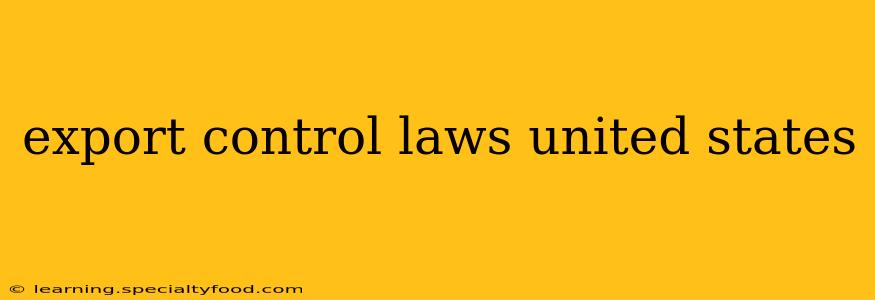The United States has a complex system of export control laws designed to prevent the proliferation of weapons of mass destruction, protect national security, and safeguard sensitive technologies. These laws regulate the export, re-export, and transfer of a wide range of items, including goods, software, and technology. Understanding these regulations is crucial for businesses involved in international trade to avoid significant legal and financial penalties.
What are Export Control Laws?
Export control laws are regulations that govern the movement of certain items out of the United States. This encompasses not only physical goods but also technology, software, and technical data. The goal is to prevent these items from falling into the wrong hands – those who might use them to harm U.S. national security interests or engage in activities that violate U.S. foreign policy objectives.
These laws aren't just about physically shipping goods overseas. They also apply to:
- Re-export: Sending controlled items from one foreign country to another. Even if the initial export was legal, subsequent transfers could violate U.S. laws.
- Transfer: This includes transferring technology or software electronically, such as through downloads, email, or cloud services.
Which Agencies Enforce Export Control Laws?
Several government agencies share responsibility for enforcing export control regulations. The primary ones include:
- Bureau of Industry and Security (BIS): Part of the Department of Commerce, the BIS administers the Export Administration Regulations (EAR). The EAR covers a broad range of dual-use items – items with both commercial and military applications.
- State Department: The State Department regulates the export of defense articles and services under the International Traffic in Arms Regulations (ITAR). These regulations apply to items specifically designed for military use.
- Office of Foreign Assets Control (OFAC): OFAC administers sanctions programs that prohibit or restrict transactions with certain countries or individuals. These sanctions can impact export activities.
What Items are Subject to Export Controls?
The items subject to export controls are diverse and often depend on their end-use and destination country. Generally, they fall under these categories:
- Defense articles: Weapons systems, ammunition, and related technology.
- Dual-use items: Items with both civilian and military applications, such as certain electronics, chemicals, and software.
- Nuclear-related items: Technology and materials that could be used in the development of nuclear weapons.
- Sensitive technology: Technology that could enhance the capabilities of other nations, particularly in areas such as cyber security or artificial intelligence.
How to Determine if an Item is Subject to Export Controls?
Determining whether an item is subject to export controls can be complex. You may need to consult the following resources:
- The EAR: For items under the jurisdiction of the BIS.
- The ITAR: For defense articles and services under the jurisdiction of the State Department.
- OFAC's website: For information on sanctions and prohibited transactions.
- Export control attorneys: For expert advice on navigating the complexities of export regulations.
What are the Penalties for Violating Export Control Laws?
Violating export control laws can result in severe consequences, including:
- Significant fines: Companies and individuals can face substantial financial penalties.
- Criminal prosecution: Serious violations can lead to jail time.
- Loss of export privileges: Companies may lose their ability to export goods in the future.
- Civil penalties: These can include significant monetary fines and other repercussions.
How Do I Comply with Export Control Laws?
Compliance requires a multi-pronged approach:
- Know your goods: Understand the classification of your products and whether they are subject to export controls.
- Know your customer: Scrutinize your customers to ensure they are not involved in prohibited activities.
- Maintain accurate records: Keep detailed records of all export transactions.
- Obtain necessary licenses and approvals: If required, obtain all necessary export licenses and approvals before shipping any controlled items.
- Conduct regular training: Ensure your employees are adequately trained on export control regulations.
- Seek professional guidance: Consult with export control experts to ensure compliance.
What is the difference between EAR and ITAR?
EAR (Export Administration Regulations): Covers dual-use items that have both commercial and military applications. Administered by the Department of Commerce's Bureau of Industry and Security (BIS).
ITAR (International Traffic in Arms Regulations): Covers items specifically designed, developed, or produced for military use. Administered by the U.S. Department of State.
The key difference lies in the intended end-use of the item. If the item is primarily for commercial use, it falls under EAR. If it's primarily for military use, it's governed by ITAR. Some items may fall under both.
What is an Export License?
An export license is a formal authorization from the U.S. government permitting the export of a controlled item. The specific type of license needed depends on the item, its destination, and the end-user. Failure to obtain a required license before exporting can lead to serious penalties.
How can I find out more information?
For detailed information and the latest updates on U.S. export control laws, you should consult the official websites of the BIS, the State Department, and OFAC directly. You should also consider seeking professional legal advice from an export control attorney experienced in this field. These agencies frequently update their guidelines and regulations, so staying informed is crucial. Navigating the complexities of these laws is vital for compliance and avoiding potential legal repercussions.
